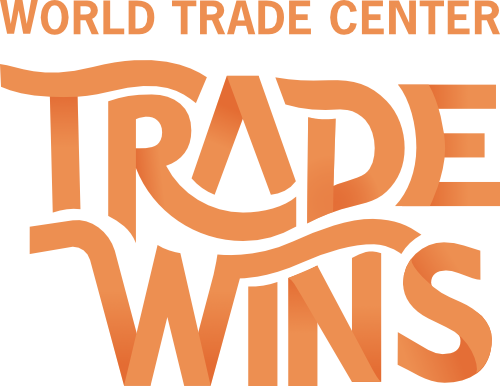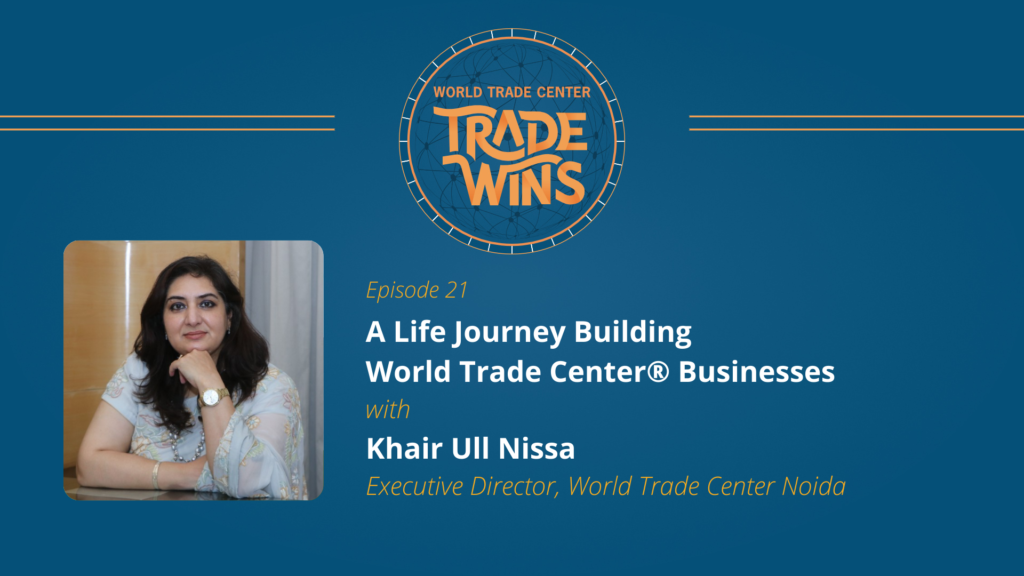Robin van Puyenbroeck 0:07
Welcome back to Trade Wins. I’m Robin van Puyenbroeck, your host and my guest today is Khair Ull Nissa from India. So, Khair, welcome to the show.
Khair Ull Nissa 0:17
Thank you, Robin. I’m really excited to be here.
Robin van Puyenbroeck 0:19
Thank you. Khair is also a board member of the World Trade Centers Association and a very avid supporter of the World Trade Center concept. Right, Khair? You’re involved with multiple licenses, World Trade Centers in India. But before we talk a bit more about the World Trade Centers, tell us a bit more about yourself. What do you want people to know? What would you like people to know about you, about Khair? Who’s the person behind the resume that we find online?
Khair Ull Nissa 0:47
Thanks, Robin. I am a very simple person. I belong to Kashmir, a small city in India, and I am from aMuslim conservative family. To be where I am, representing India on the global stage of the World Trade Center, It’s a great achievement. My friends and my family, everybody has been very, very supportive. This journey has not been easy, considering that I left Kashmir at the age of 15 when my father was kidnapped, and we moved from Kashmir to Delhi, and from Delhi to Singapore, from Singapore to the U.S., to Dubai. And ultimately, we got settled in Dubai, and always wanted to come back to India, always wanted to come back to go back to Kashmir and start our business once again. So that’s how my journey of international experience from a small town in Kashmir started internationally.
Robin van Puyenbroeck 1:47
So you went back to India from Delhi, so how did you find the World Trade Center concept? How did that happen?
Khair Ull Nissa 1:55
I got married, and that’s what brought me back to India. I got married to an Indian who was settled in India doing business so that brought me to India. Incidentally, I came into real estate, when I started working in India, I went into real estate. And it so happened 9/11 had just happened. World Trade Center and I saw World Trade Center Mumbai, which was the first World Trade Center we had in India. And after that, in 1995, I believe we had World Trade Center Bengaluru. So there were two World Trade Centers. I was very excited because I was in Delhi NCR, which was a very beautiful, mixed-use development, huge in size, and had all the ingredients that I knew of the World Trade Center whenever I was in the World Trade Center. Whenever I was in New York or was in Dubai, I had seen World Trade Center Dubai, and what World Trade Center Dubai had done for Dubai. So I was very excited that if we could get the World Trade Center for this project in Delhi NCR incidentally, which is WTC Noida, that we could create a destination and we could create an impact. So that is how I got introduced to World Trade Center Mumbai and World Trade Center Bengaluru. And I got in touch with Robert who was, at that time, in charge of businesses and members. And he and Scott Wang actually took me through and helped my journey in World Trade Center Noida since 2016.
Robin van Puyenbroeck 3:36
2016, so that’s quite the journey, and how—
Khair Ull Nissa 3:39
2013, actually. When we got the license in 2016, we launched it, it actually came live with 2 million square feet and that million square feet was taken by Vivo, the first electronic mobile company, which invested in India.
Robin van Puyenbroeck 3:56
That’s a massive project. So in all those years, the world has changed, of course, and technology is becoming more and more obviously important in all the things we do. How has your experience with the World Trade Center brand changed in those six or even nine years?
Khair Ull Nissa 4:14
It’s been an amazing journey, Robin. I represent a partner of World Trade Center which owns 13 licenses, which is Viridian I would call them a maverick in the World Trade Center fragility because they actually disrupted a lot of things 13 licenses, they wanted to have an hub and spoke model because they were looking at a market reach of one-third of Indian MSMEs. At the same time they created a services arm which was on the pillars of access to money, access to the market, and access to mentors. So they created a service which was very independent in itself and with their own profit and loss. But at the same time providing services to the World Trade Centers and the World Trade Centers that they designed, were more from a hub perspective. So humans, people, were the core of their design elements. So our World Trade Centers are like market hubs. So from a real estate perspective, we don’t call them real estate, we call the trade infrastructure. This trade infrastructure is actually serviced by other companies. So we are very, very collaborative in nature, we don’t duplicate, we collaborate with various partners who help us in scaling up in reaching out to the market. But, it is access to money, access to the market, and access to mentors. That has been the principle that we have followed for the World Trade Center. And this principle has actually seen us through this journey. This journey has been a nine-year journey now for us. And it’s been very successful. And the success comes from the fact that World Trade Center Noida started as 2.1 million square feet. Now it is 5 million square feet and 5000 acres which have been dedicated by the government as MOX; it was inaugurated by the Prime Minister of the country as an electronic city. So that’s a great achievement for us. We’ve got 50,000 people working already for World Trade Center Noida. And it’s not complete as of yet, because it’s only 2.1 million square feet which is ready out of the 5 million, and 100% occupied lease from day one. Similarly, World Trade Center GIFTCity, 1.5 million square feet in the first phase, 6 million square feet in different upcoming phases. We started with 1.5 million but now it’s 6 million square feet. And we’ve already got 100% lease already – three-towers ready and three towers completely leased out. It’s a great story for us.
Robin van Puyenbroeck 7:06
It is a great story, indeed. And you mentioned so it’s all a matter of being successful, having access to capital and all that, but also having access to mentors. So, in your experience, you mentioned it wasn’t always easy, which I can, of course, imagine also as being a successful woman entrepreneur, what were the challenges? What were the roadblocks or challenges that you encountered? Can you share some of those experiences?
Khair Ull Nissa 7:32
The first of the four was the knowledge about the World Trade Center in the country. I mean, the new World Trade Center was a very well recognized brand. But they did not know what this brand did, or what the possibilities with this brand were. They did not know that. So that awareness – that creation of that awareness was a huge task. Getting the government to actually start working with us, not looking at us as a real estate developer, but as a not-for-profit organization, which created this real estate as a market hub. For them to actually trust us and to start working with us, including us in policy application. And the proof of the icing is, I mean the cherry on the cake for us was when we started World Trade Center GIFT City. At that time the Prime Minister of India, today’s Prime Minister was the Chief Minister of Gujarat, and he wanted the World Trade Center there because he was so familiar with World Trade Center GIFTCity. He actually helped create a committee which was headed by the chief minister, which still exists, which was headed by the Chief Minister. In his absence, the additional chief secretary, and had all the chambers, all the stakeholders of the trade. The chamber, the GujaratChamber of Commerce, Credai, the Ministry of Commerce, the government departments like science and technology, the Gujarat startup committee, KCRW, which is the idea and its Association. And the name of the committee, you would be surprised is the committee which is named “For the success of World Trade Center GIFT City”. It was very innovative.
Robin van Puyenbroeck 9:26
Very innovative, indeed.
Khair Ull Nissa 9:28
Leaves nothing to the imagination.
Robin van Puyenbroeck 9:30
I like your description as those trade hubs. We also like talking about the World Trade Center as real beehives of economic activity, so this is where all of this comes together. But so now that you have all this infrastructure these operations, maybe just a few comments on India. India has been very hard hit by COVID as well, like many other countries in the world, so how’s the situation now with COVID? And what was the impact on business environments? Because India of course is a major trading partner with many countries around the world. So how is that? How’s COVID now and how has it impacted the sort of the trade relations and doing business abroad?
Khair Ull Nissa 10:10
COVID has impacted everybody and India was no different. It hit us because we realized that there is a lot of capacity building which we require. We were actually rising on and we’re very bullish about the economy, because we’re the third-largest economy in the world, a very growing startup hub in the world economy, lots of I mean, number three, in terms of the millionaires, the number of millionaires.But, COVID actually made us realize that we were not prepared for disruption or such calamities or black swan conditions. So that was the downside, we lost a lot of lives. In fact, the World Trade Center, our community, also suffered a lot of loss of lives, and family members lost their family members. But at the same time, what we realized that India is very resilient, we are very resilient. We have started building up our capacities – our regional and local capacities. And we’re concentrating on that the government has actually come up with an initiative of “Atmanirbhar”, which means self-reliance, and it is doing everything that is possible for the MSMEs that in every sector under “Make In India,” that is the 25 sectors under “Make In India,” we, India becomes capable and self-reliant in itself. And the policies and everything are actually conducive to that. We’ve seen and globally we’re also seeing war, the impact of the war between Russia and Ukraine is having and we’ve had some trouble with our neighbors like China and Pakistan. OurBoard of Trade, which used to happen between China and Pakistan, we stopped trade with Pakistan, per se. But with China, we still do have that. But we are not trading as much as we were previously. The investments which were coming from China earlier were much more, but now we’ve actually kept some checks and balances for the investments which are coming from China. So we are not that open for investments from China to come in. But currently, we are seeing a huge demand for food and agriculture – agriculture products – because of the war between Russia and Ukraine, the locally between the countries, the neighboring countries, which we call the sub-countries, there’s a huge demand for wheat and food, material, food grades, which is happening.
Robin van Puyenbroeck 12:43
There is definitely a major impact everywhere in the world. And so I would just want to come back to the notion of technology with World Trade Center GIFTCity. And also you mentioned the importance of self-reliance and small- and medium-sized enterprises. We’ve also at the association rolled out an artificial intelligence-powered sort of business-to-business networking functionality. How important can this be, you think, as a tool – not to replace in-person contacts and in-person interactions – but sort of in complement of those interactions? So what do you think about tools like this, where we tried to focus on just cost and time efficiencies, just to find new ways to connect people, especially when you look at small/medium enterprises,they have often more limited resources to travel or to find places to meet other prospects and business partnerships? What are your thoughts on this concept, on the technology, the role of technology in this matchmaking, in this business development?
Khair Ull Nissa 13:44
We cannot deny the role that technology is going to play in terms of connecting, I mean, it is going to shorten the bridge and the connections between people between businesses. We’re living in a borderless world right now. I mean, thanks to technology and the internet, I believe that it is a good use of our network, this technology, and fortunately COVID, the pandemic, has actually made a lot of people who were averse to such technology have made it more usable and mobile. So there’s a lot of mobility with that we see and I see in India, because of the rise of smartphones. Withalmost 80% penetration of smartphones in India, and thanks to initiatives like “Digital India” and “Startup India,” we see even the fruit vendor a small fruit vendor who’s actually at the lowest level of the pyramid, you know, the business pyramid, has actually got access to the digital technology and use of digital technology, even cashless payment, even to the level of cashless payment it. So the usage of AI-technology, or matchmaking for connections is immense. And we see that in times to come, it is going to be bigger and bigger.
Robin van Puyenbroeck 15:12
India, of course was one of the if not the first country that also started using a more cashless society right with those electronic payments.
Khair Ull Nissa 15:21
Demonetization, which we actually came up with. That accelerated the use of the cashless technology payment option. We have our own ATM, you know, just like you have Google Pay, we have an Indian made, like Paytm and PhonePe, which has huge penetration in Indian households.
Robin van Puyenbroeck 15:47
Technology is really embedded in everything we do, of course, but it’s also incredible because of the size, of course of India and the population, that adoption of technology is so strong and at every level. Do you think COVID accelerated that process? Or was it something that India was doing?
Khair Ull Nissa 16:09
It did. So for India, the acceleration happened because of the demonetization. It happened due to COVID – both of these factors accelerated the use of digital technology.
Robin van Puyenbroeck 16:22
I think it’s fascinating this demonetization, because of course, even in the U.S. many people here don’t use cash anymore either. But it’s still a very cash-driven society, it’s very different than just going all in with demonetization, so I think it’s a very interesting initiative that I don’t think is well-known. So I’d be curious to see how that further develops because if that becomes a real success, then that’s definitely something that will be—
Khair Ull Nissa 16:51
That was the very reason for which our Prime Minister actually came up with,demonetization. Overnight that there were currencies that were actually replaced and new currencies actually came into being. In addition, there was the GST, which is the one tax across India, so there’s just one tax across India. So, which was considering that India is a very diversified country, and coming up with two such important and very aggressive, disruptive policies, one after the other. And then COVID, it did impact us. So downside was it did impact and t slow down the business sector for a certain period of time, but COVID actually accelerated it – it gave it the push, which was required.
Robin van Puyenbroeck 17:38
Yeah, interesting. Maybe as a sort of final question, with your experience, and journey with multiple World Trade Centers in a vast market, how would you describe the ideal World Trade Center? What is that for you?
Khair Ull Nissa 17:54
For me, I actually breathe and sleep and everything “World Trade Center.” I am such a big advocate for the World Trade Center [brand]. But naturally, from the fact that not only is it a business hub, but because of the services, we can make a lot of impact and difference not only in the region and the communities, but at every level. Whether it’s women empowerment, whether it’s the grass-roots level, whether it’s pink collars, whether it’s blue collars, we have everything to offer for everyone and make a difference in everyone being in the community, all the stakeholders. So the World Trade Center [brand] is just not a concept. The world actually should center around the World Trade Center [brand].
Robin van Puyenbroeck 18:45
I think that’s good. This is a good quotable moment.
Khair Ull Nissa 18:53
In Noida, we are the nucleus for the electronic city. World Trade Center Noida is the nucleus around which the entire electronic city is coming around – the policies that the government has come up with; the warehousing policy, the data center policy, the electronic policy. Can you imagine that because of the World Trade Center and the initiatives that World Trade Center Noida played – the IT policy, which was at one time considered to be one of the most important sectors, has become a part of the electronic policy, rather than the other way around.
Robin van Puyenbroeck 19:32
Interesting. Yeah, good point. Well, good. Well, thank you. And before wrapping it up, I always like to ask, sort of the final question, is there anything you can share with us here that you all have good have not shared? But that you have not shared before? That’s the key here.
Khair Ull Nissa 19:50
I have millions of stories, but the most important – something which really touches my heart, is the difference that we have made amongst the women community, especially in real estate, we have been, the World Trade Centers, across India, have been advocating for women leadership. And we have, especially in real estate, we see very few women, leaders in the real estate community, we’ve tried to bring and encourage women in the real estate community. And we’ve set up an accelerator, we’ve set up an association for women, where they come together and help each other. And I have been advocating for them, and we all are helping each other, so we’ve become a tribe. So I think that women are a tribe and we are really living it. And we have been working in communities and providing them with sustainable livelihood under the “Make In India” campaign, giving them access to India. India’s the land of handicrafts and crafts, we’re known for that. So we’ve got artisans who are skilled, but to rescale them, to repurpose their skills and to give access to their products and convert them into entrepreneurs, so that they get a livelihood, which is with dignity. So that is something that I have been working on. And I feel that I’m making a huge difference there. And that is only thanks to the World Trade Center.
Robin van Puyenbroeck 21:30
And you are, Khair, certainly a role model for many women around the world. Because as successful as you are, that’s always something for people to look up to and knowing that it is possible that it can be done. Thank you so much for being on the show today. Thank you.
Khair Ull Nissa 21:48
Thank you, Robin. God bless. Take care.
Robin van Puyenbroeck 21:50
If you have any ideas for future episodes, know someone who would be an inspiring guest, or just want to stay apprised of our show, please make sure to connect with our team via email at podcast@wtca.org. Be sure to head over to podcast.wtca.org and subscribe to the show. We will see you soon.






